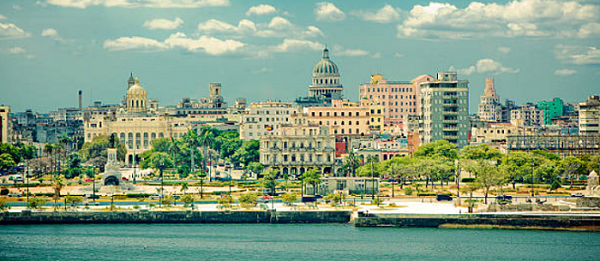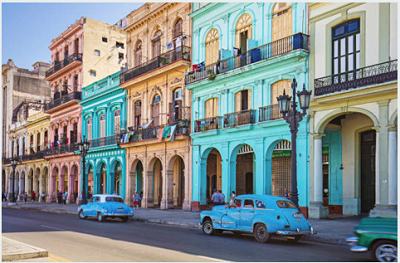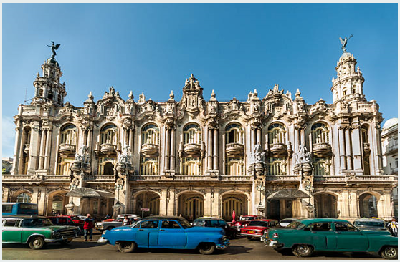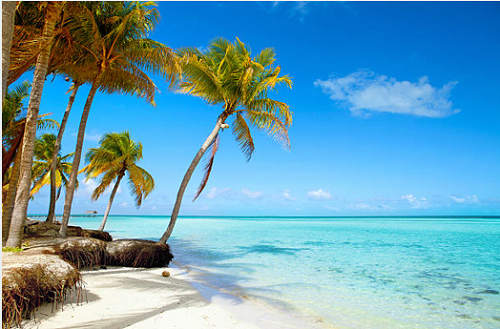Planning a trip to Cuba and what new regulations really mean to US Citizens + History Facts (Timeline of travel and trading restrictions)

To most people from around the world travel to Cuba is easy, but for US citizens it might be a challenge. You probably have seen many articles about new regulations that restrict US citizens from traveling to Cuba as tourists, but no one really explains in details how exactly do we travel there and what new regulations really mean. The explanation in every article I’ve seen gave me only more reason to think that it will be hard to travel to Cuba and I shouldn’t plan a trip there. But the thing is it's not true that new laws made travel to Cuba a lot harder, in fact it barely changed for travelers. New regulations mostly apply for businesses and it’s just enforcing what was already in the regulations before. These new regulations are supposed to punish stores, hotels, and other businesses that are tied to the Cuban military. The plan was to direct economic activity toward businesses that are controlled by regular Cuban citizens.

All these articles made me question the reason why everything is happening and I decided to do my own research. Let's start from the beginning with history facts ...
1963: US citizens are prohibited from visiting Cuba. Kennedy imposed travel restrictions on February 8, 1963, and the Cuban Assets Control Regulations were issued on July 8, 1963, again under the Trading with the Enemy Act in response to Cubans hosting Soviet nuclear weapons. Under these restrictions, Cuban assets in the U.S. were frozen and the existing restrictions were consolidated.
1977: The restrictions on U.S. citizens traveling to Cuba lapsed on March 19, 1977; the regulation was renewable every six months, but President Jimmy Carter did not renew it and the regulation on spending U.S. dollars in Cuba was lifted shortly afterwards.
1982: President Ronald Reagan reinstated the trade embargo on April 19, 1982, though it was now only restricted to business and tourist travel and did not apply to travel by U.S. government officials, employees of news or film making organizations, persons engaging in professional research, or persons visiting their close relatives.
1992: The embargo was reinforced in October 1992 by the Cuban Democracy Act (the "Torricelli Law"), which prohibited foreign-based subsidiaries of U.S. companies from trading with Cuba, travel to Cuba by U.S. citizens, and family remittances to Cuba.
1996: After Cuba shot down two unarmed Brothers to the Rescue planes in 1996, killing three Americans and a U.S. resident, a bi-partisan coalition in the United States Congress approved the Helms-Burton Act, which is a United States federal law which strengthens and continues the United States embargo against Cuba.
1999: New policy changes opened the door to legal travel to Cuba for Americans through people-to-people exchange programs, with the goal of enhancing cross-cultural relations between Americans and Cubans.
2000: the embargo was relaxed by the Trade Sanctions Reform and Export Enhancement Act, which was passed by the Congress in October 2000 and signed by President Bill Clinton. The relaxation allowed the sale of agricultural goods and medicine to Cuba for humanitarian reasons. Although Cuba initially declined to engage in such trade (having even refused U.S. food aid in the past, seeing it as a half-measure serving U.S. interests), the Cuban government began to allow the purchase of food from the U.S. as a result of Hurricane Michelle in November 2001.
2000: InsightCuba received its specific license from the U.S. Treasury Department’s Office of Foreign Assets Control, and pioneered the first Americans to legally travel to Cuba through its people-to-people Cuba tours.
2003: New travel restrictions were enforced, banning virtually all Americans once again from visiting Cuba.
2011: On January 28, 2011, people-to-people travel was restored, meaning any American could once again travel to Cuba legally with insightCuba. On July 25, 2011, the Department of the Treasury’s Office of Foreign Assets Control (OFAC) declared that the "people to people" relaxation of restrictions on travel should not be mistakenly interpreted as promoting tourism.
2017: on June 16, 2017, OFAC is amending the Cuban Assets Control Regulations to implement the National Security Presidential Memorandum (NSPM), “Strengthening the Policy of the United States Toward Cuba”. These amendments implement changes to the authorizations for travel to Cuba and related transactions and restrict certain financial transactions. These amendments also implement certain technical and conforming changes.
Now that you know the history and why it is so complicated to travel to Cuba, I will explain what new regulations really mean. First of all, you need know that these restrictions are made by US government, not Cuba! USA are the ones that don’t want us to travel as tourists, but for a good reason. So, what really changed for us, travelers is that there is no more individual People-to-People program , but we can still do it in the group (tours). So, legally Americans who want to meet Cubans will now have to travel in groups accompanied by an authorized representative of the trip’s sponsoring organization. To be honest, previous individual people-to-people program is the same thing as “Support for the Cuban People”, which is under 12 categories (see below). This means that we can still plan our own itineraries and travel without expensive tour programs.
Travel to Cuba for tourist activities remains prohibited by statute. However, the Department of Treasury’s Office of Foreign Assets Control (OFAC) has issued general licenses for 12 categories of travel. Individuals who meet the regulatory conditions of the general license they seek to travel under do not need to apply for an additional license from OFAC to travel to Cuba.
If you decide not to go with a tour company, which costs around $3500 for a week per person, then you will have to apply for the license and choose a category from this list:
1. Family visits
2. Official business of the U.S. government, foreign governments, and certain intergovernmental organizations
3. Journalistic activity
4. Professional research and professional meetings
5. Educational activities
6. Religious activities
7. Public performances, clinics, workshops, athletic and other competitions, and exhibitions
8. Support for the Cuban people
9. Humanitarian projects
10. Activities of private foundations or research or educational institutes
11. Exportation, importation, or transmission of information or informational materials
12. Certain authorized export transactions.
To understand these 12 categories better, I recommend you to check out the actual document of all regulations read here
Just press Ctrl + F , and type the keyword of a reason you want to choose.


The most common and probably the easiest reason to choose is “Support for the Cuban People” because what you really need to do is to provide a proof of spending money at privately owned Cuban restaurants (Paladares) and shop at privately owned stores that are runned by self-employed Cubans (Cuentapropista). Also, you would have to stay at privately owned Cuban residence (Casa particular), which is AirBnB. To be honest, to me it sounds like a perfect trip because this way you will actually learn about Cuban Culture. It is kind of the point going to Cuba anyway! Also, go to some churches or some charities and donate several $. Make sure you have some kind of proof (write a diary and take a picture, save receipts). If you take pictures make sure they don’t look too touristy. Another idea is to take some cooking or dance classes, as long as you are engaging in a full-time schedule of activities that will result in a meaningful interaction with individuals in Cuba and that will enhance contact with the Cuban people, support civil society in Cuba, or promote the Cuban people’s independence from Cuban authorities.
You will have to apply for the license here and write about your schedule there.
Note that they might not even ever check this information, but you do have to keep the records for five years just in case. Also, technically you are not supposed to go to the beach , but it is okay to go there and relax for couple hours, as long as you have 7-8 hours per day of itinerary that you can show to US government and just don't mention your beach time. Another idea how to spent some time at the beach legally is to get some dance classes at the beach or rent a room/house by the beach.

When you are done with getting your license, you may buy the ticket, and later you will have to get Travel medical insurance and Cuban Visa. You get your visa through Cuba Travel Services or at the airport , it all depends what airline you will be flying (you will have to contact your airline for more details).
Also, you should know about the list of Restricted Entities and Sub Entities Associated with Cuba as of November 9, 2017 read here . This list tells you where you should not stay, eat or get your tours from. I suggest staying at AirBnB.
...and one last thing, Cuba does accept credit or debit cards, but only few newer businesses do that. Expect to pay with cash and know that exchange rates for US Dollars aren’t good, so maybe it’s worth exchanging dollars for euros to get a better rate in the tourist money (Cuban convertible pesos, or CUCs.)
...and now, I have to plan my own trip there because I am going to Cuba in 2 months! :)
Pictures from istockphoto.com

DISCLAIMER: dropahead Curation Team does not necessarily share opinions expressed in this article, but find author's effort and/or contribution deserves better reward and visibility.
to maximize your curation rewards!
with SteemConnect
Do the above and we'll have more STEEM POWER to give YOU bigger rewards next time!
News from dropahead: Bye bye 25+ and 50+! Welcome 20+ 40+ and 60+!
Quality review of the dropahead cure team
According to our quality standards(1), your publication has reached a score of 90%.
Well said Gabriel García Marquez: "You learn to write by writing" Keep trying, you will soon achieve excellence!
(1) Witness dropahead quality standards:
-Graphic relation to the text (Choice of images according to the text)
- Organization and coherence
- Personal sense of the text (Logic, complexity, understanding, what makes it interesting for the reader)
thanks. 90%, not too bad I guess :) I will try to get 100% next time ;)
Continue striving will achieve greatness thanks for using the DropAhead channels! ;)
thank you :)
Now that was some excellent information... CHEERS!
And have a good time!!!
thank you! :)
Resteemed to over 6400 followers and 100% upvoted. Thank you for using my service!
Send 0.100 Steem or 0.100 Steem Dollar and the URL in the memo to use the bot.
Read here how the bot from Berlin works.
@resteem.bot
Congratulations! This post has been upvoted from the communal account, @minnowsupport, by Ella-Kay from the Minnow Support Project. It's a witness project run by aggroed, ausbitbank, teamsteem, theprophet0, someguy123, neoxian, followbtcnews/crimsonclad, and netuoso. The goal is to help Steemit grow by supporting Minnows and creating a social network. Please find us in the Peace, Abundance, and Liberty Network (PALnet) Discord Channel. It's a completely public and open space to all members of the Steemit community who voluntarily choose to be there.
If you would like to delegate to the Minnow Support Project you can do so by clicking on the following links: 50SP, 100SP, 250SP, 500SP, 1000SP, 5000SP. Be sure to leave at least 50SP undelegated on your account.
@originalworks
The @OriginalWorks BETA V2 bot has upvoted(0.5%) and checked this post!
Some similarity seems to be present here:
https://en.wikipedia.org/wiki/United_States_embargo_against_Cuba
This is an early BETA version. If you cited this source, then ignore this message! Reply if you feel this is an error.
I did cited this source :) its the part about history facts
This post has received a 0.35 % upvote from @drotto thanks to: @banjo.
I didn't know it was so hard to get into Cuba, looks like a beautiful place though!
Yea, it is kind of complicated, but i think it is totally worth it! Its like going back in time! Very excited to go there.
Your post had been curated by the @buildawhale team and mentioned here:
https://steemit.com/buildawhale/@buildawhale/buildawhale-curation-digest-12-19-17
Keep up the good work and original content, everyone appreciates it!